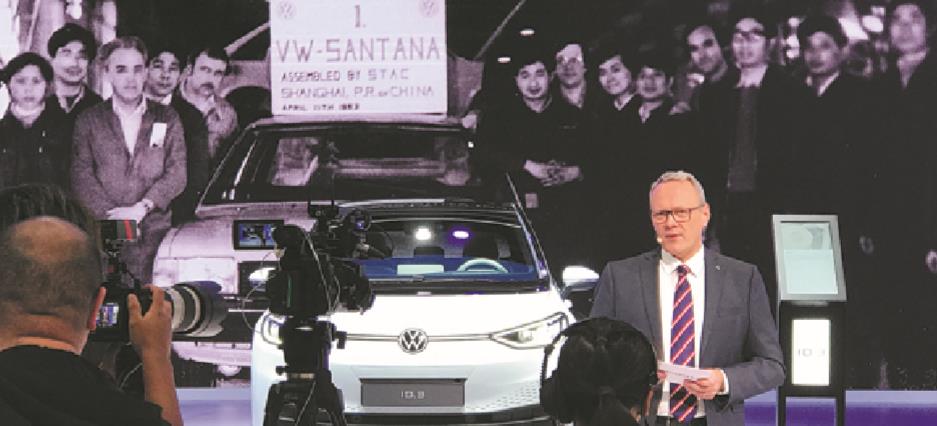VW calls for policy support to help sales bounce back

German carmaker Volkswagen is calling for favorable policies in China to boost consumption as the country recovers from the novel coronavirus epidemic.
Stephan Wollenstein, CEO of Volkswagen Group China, hopes authorities will postpone the introduction of the stricter State VI emissions standard and roll out non-monetary measures to stimulate sales of new energy vehicles.
"The automotive industry and other related industries together account for around 10 percent of GDP, so if China really wants to generate more GDP growth, then stimulating the automotive industry is key," Wollenstein said on Wednesday.
Volkswagen is one of the most popular carmakers in China, with sales of its brands ranging from the namesake Volkswagen to premium brands Audi and Porsche combining to account for about 20 percent of the country's passenger car sales.
But the company is suffering from the epidemic. In the first two months of the year, sales nosedived to 400,000, with China's total passenger car sales 1.81 million, down 43.6 percent from the same months last year.
Wollenstein said the impact of the epidemic would continue for a while and the auto industry won't return to last year's levels until May, June or July. The carmaker estimated the country's overall passenger sales this year will slide by 600,000 to 3 million, representing a fall from 3 percent to 15 percent year-on-year.
Wollenstein said he hopes the government will consider delaying the introduction of the new emission standards, which are scheduled to take effect on July 1.
Other carmakers including GM made a similar plea earlier this month.
"It is not because we or the industry are not technically ready for the new standard, but because the crisis really affected our ability to sell the older models," Wollenstein said.
He also called for the government to consider non-monetary measures to boost the popularity of new energy vehicles as the subsidies are expected to be gone by the end of the year. He added that authorities should make it easier to use the cars, including no-ban days on roads and improving the charging infrastructure so that such vehicles can be charged easily.
China had 1.24 million charging poles, both private and public, by the end of January 2020, according to the country's charging infrastructure promotion alliance. That's up 45.8 percent compared to a year ago, but it still lagged far behind the number of new energy vehicles, which total 3.85 million.
"Charging, along with a number of other benefits, will be the deciding factor whether new energy vehicles will really happen in China," said Woellenstein. "This would be for me the main point, it's not about unsustainable subsidies."
Volkswagen aimed to sell 400,000 new energy vehicles this year, but it seems the goal will be difficult to achieve considering the epidemic-driven decrease in demand.
But Wollenstein said the company will not change relevant investment plans.
Late last year, Volkswagen said it would spend 1.6 billion euros ($1.71 billion) this year in China on electrification and digitalization. That would account for 40 percent of its total investment in the country.
Volkswagen is still aiming to see its sales of new energy vehicles reach 1.5 million in 2025.
Wollenstein said by then the company will have purpose-built electric car platforms, the MEB and the PPE, in place as well as vehicles with a range of 400 to 650 km. He said within the next two to three years the company will achieve a share in the new energy vehicle sector as it does in the overall market.
Volkswagen-branded vehicles account for around 15 percent and the group's vehicle sales, around 20 percent. "With the MEB platform in place in 2021 and 2022, we should be on track," he said.

